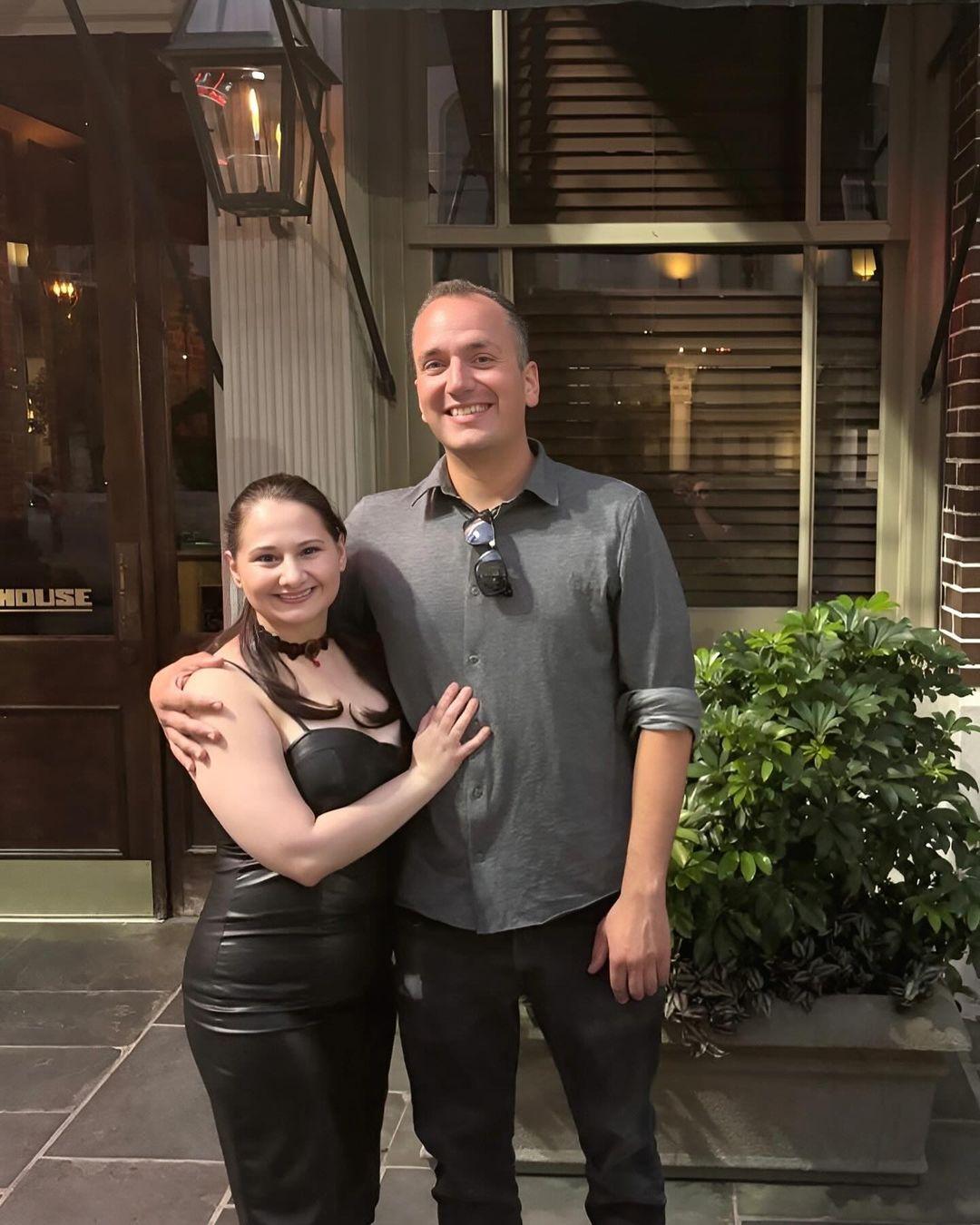"We Did Not Find Results" Issues: What To Do Next
Has love, even in its most unconventional forms, the power to endure the weight of past transgressions and societal judgment? Gypsy Rose Blanchard's recent embrace of a new chapter, marked by a sweet tribute to her boyfriend, Ken Urker, and his move to New Orleans, offers a compelling, if controversial, look into the complexities of human connection in the wake of unimaginable circumstances. The story of Gypsy Rose, and the relationship she's cultivated with Urker, demands attention and reflection, forcing us to confront uncomfortable truths about manipulation, justice, and the ever-elusive definition of redemption.
On Tuesday, June 25th, the world watched as Blanchard, now 32, utilized the platforms of Instagram and TikTok to share a glimpse into her evolving life. This act, seemingly innocuous in the digital age, takes on profound significance when considering the context: Blanchard's release from prison and her subsequent journey toward rebuilding a life after a harrowing past. The very act of sharing, of opening a window into her private world, signals a deliberate choice to engage with the public, inviting scrutiny, judgment, and, perhaps, understanding. The move of Ken Urker to New Orleans suggests a commitment to the relationship, and a willingness to navigate the complexities of living alongside someone who has such a unique and fraught past. This relocation signifies more than proximity; it embodies a choice to stand by, to support, and to share in the aftermath of decisions with grave repercussions.
| Aspect | Details |
|---|---|
| Full Name | Gypsy Rose Blanchard |
| Age | 32 (as of June 2024) |
| Known For | Conviction in the murder of her mother, Dee Dee Blanchard. The case garnered significant media attention due to Dee Dee's Munchausen syndrome by proxy, and the elaborate deception she maintained about Gypsy Rose's health. |
| Relationship Status | In a relationship with Ken Urker. |
| Key Events |
|
| Recent Actions | Sharing a tribute on social media to her boyfriend, Ken Urker, after he moved to New Orleans to be closer to her. |
| Public Perception | The public perception of Blanchard remains deeply divided, as many believe she was a victim of her mother's abuse, while others struggle to reconcile her role in the murder with any notion of sympathy or understanding. |
| Reference Link | Wikipedia |
The narrative that has unfolded around Gypsy Rose Blanchard is nothing short of a modern-day tragedy, a story that continues to captivate and repulse in equal measure. The core elements are all too familiar: a vulnerable young woman ensnared in a web of deception spun by her own mother, Dee Dee Blanchard. For years, Gypsy Rose was made to feign a litany of debilitating illnesses, a cruel manipulation that robbed her of a normal childhood and adolescence. Dee Dee, it was later revealed, suffered from Munchausen syndrome by proxy, a psychological disorder that manifests in a parent fabricating or inducing illness in their child for attention and sympathy.
The consequences of this abuse were devastating. Gypsy Rose was subjected to unnecessary medical procedures, forced to use a wheelchair despite being able-bodied, and kept isolated from the outside world. This carefully constructed facade began to crumble as Gypsy Rose, desperate to escape her mother's control, turned to the online world. She connected with Nicholas Godejohn, an online boyfriend, and together, they plotted and executed Dee Dee's murder. The details are gruesome, a chilling testament to the desperate lengths to which a person, especially one who has endured prolonged trauma and abuse, can go to find freedom.
The legal ramifications of this act were swift. In 2016, Gypsy Rose was convicted of second-degree murder and sentenced to ten years in prison. Godejohn, who directly carried out the killing, received a life sentence. While incarcerated, Gypsy Rose's story continued to resonate. The media latched onto the case, exploring the intricacies of Munchausen syndrome by proxy, the power of manipulation, and the devastating impact of childhood abuse. Documentaries, television series, and countless articles were created, and these served to keep the Blanchard case very much in the public eye.
The emotional and psychological impact of being manipulated and controlled is immense. The layers of deception, the fabricated illnesses, the constant fear, and the manipulation can cause significant emotional and psychological damage. For Gypsy Rose, the weight of years of deception, the loss of her childhood, and the trauma she suffered at the hands of her mother created a complex internal landscape. Her actions, in many ways, were a direct result of the abuse she suffered and the extreme circumstances she faced.
The release of Gypsy Rose from prison in December of 2023 was a significant moment. It marked the end of a chapter, but the beginning of an even more complex one. Immediately, she faced an onslaught of public attention. The very act of walking free was a potent symbol of her agency, her chance to rewrite her story. Her use of social media, documenting her life, interacting with her followers, and sharing her vulnerabilities, offered the world insight into her life after prison. These acts are not merely about seeking validation, but rather, they are part of the process of reclaiming her identity, of forming connections, and of defining her own narrative.
The relationship with Ken Urker adds another layer of complexity. They met before her release, forging a connection that endured through prison visits and phone calls. Urkers decision to relocate to New Orleans, to be closer to her, is a bold statement. Their relationship, while it may not be entirely understood by the public, offers a glimpse into the search for connection and love after unimaginable trauma. It also forces us to confront our own biases and assumptions about who deserves love and support.
The specifics surrounding Godejohn's sentencing are important to consider, not only for the legal aspects but also for a deeper understanding of the cases complexities. Godejohn, who carried out the actual murder, received a life sentence. His motivations, while intertwined with his connection to Gypsy Rose, also included elements of his own psychological instability. The trial and sentencing brought to light the full extent of Dee Dee's manipulation and the devastating consequences it had on both Gypsy Rose and Godejohn.
It is difficult to provide a simple judgment of Blanchards actions. Her case forces a confrontation of the nuances of abuse, manipulation, and the human capacity for both violence and resilience. The role of social media has amplified her journey, creating a complex intersection of public interest and her personal life. Every post, every interview, every public appearance is scrutinized. Her story is a reminder that there are no easy answers to questions of justice, forgiveness, and redemption.
The media has helped shape the narrative and perception of Gypsy Rose's case. The various documentaries, television series, articles, and social media posts have allowed the public to dissect every detail of the Blanchard case. Some see her as a victim who was trying to escape a torturous existence. Others, despite understanding the abuse she endured, struggle with the idea of justifying the murder of her mother. The media's role is powerful, and it continues to shape the ongoing conversations and interpretations of Gypsy Rose Blanchards life.
The relationship dynamics are difficult to understand, particularly from an outside perspective. The fact that they met while she was in prison has raised questions, but their connection is undeniable. Their relationship demonstrates the possibility of growth, adaptation, and the enduring power of human connection even after someone has endured immense trauma. They have chosen to navigate their relationship in the public eye, which also comes with a responsibility to manage perceptions and maintain transparency. Time will tell how this develops.
In considering the case of Gypsy Rose Blanchard, its essential to understand the scope of the trauma she experienced. The consistent and pervasive manipulation, the enforced physical limitations, and the complete control exerted by Dee Dee had profound effects on her mental and emotional state. The complex relationship that she forged with Godejohn was a result of seeking escape. The murder was not an isolated incident, but a culmination of years of abuse. The concept of justice and mercy is tested.
The case reminds us that the choices people make are often complicated, particularly when viewed through the lens of trauma and abuse. It encourages us to look beyond simple narratives and to consider the many factors that play a role in determining human behavior. It shows the long-lasting effects of manipulation and the struggle to reclaim one's life after the devastation of extreme experiences.
The journey of Gypsy Rose Blanchard, as she seeks to rebuild her life, remains a subject of significant public interest. Her story challenges our notions of justice, victimhood, and the complexities of human relationships. The details of her life are not always easy to understand. While the initial facts of the case may seem simple, they hide layers of trauma, abuse, and the desperation to reclaim a sense of freedom. It forces us to confront some uncomfortable truths about ourselves and the society in which we live.
The ongoing narrative of Gypsy Rose Blanchard is a reminder that people are not always what they appear. Her journey will undoubtedly continue to capture the attention of the public as she navigates the next phases of her life. The question of redemption, the chance for a new beginning, remains at the core of her story. Only time will tell what the future holds, but her willingness to share her journey is a powerful testament to the human spirit.
:max_bytes(150000):strip_icc():focal(818x398:820x400)/Gypsy-Rose-Blanchard-and-boyfriend-Ken-Urker-tout-062524-010db1aefa6e4b678bb89e8653d24f88.jpg)

